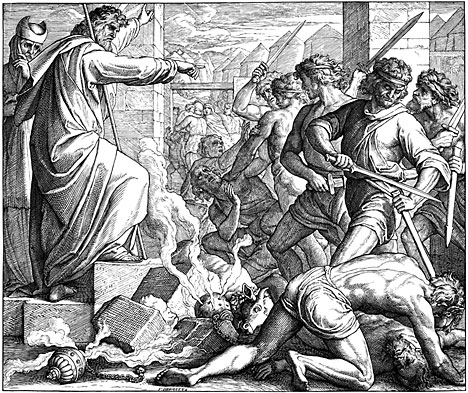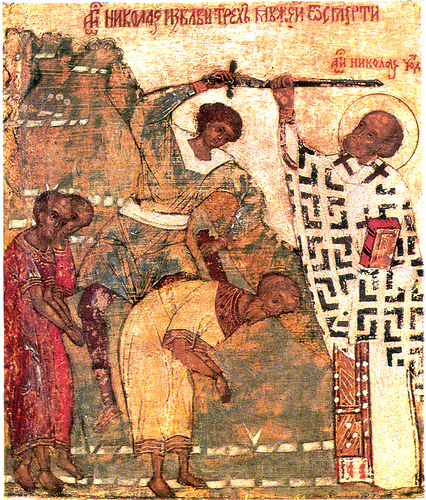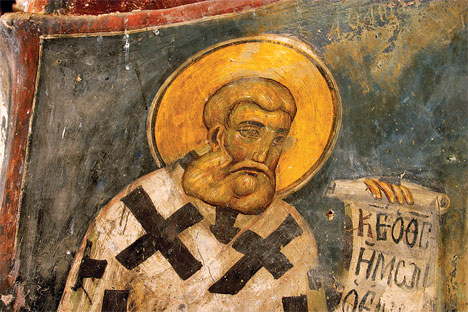Mar
16
2013

An excerpt from Jeffrey Meyers’ The Lord’s Service: The Grace of Covenant Renewal Worship, pp. 283-285.
Faith comes from hearing. —Romans 10:7a.
One does not need to read very far into Emily Dickinson’s poetry to discover that her verse often captures the quintessential American religious consciousness. Consider these lines from three of Emily Dickinson’s poems:
Continue reading
Comments Off | tags: Ecclesiology, Jeff Meyers | posted in Christian Life, Quotes
Mar
13
2013

Part 1 | Part 2
The first cycle of Ephesians expressed the call and adoption of God’s sons as a new Creation (Sabbath). At its very centre was the phrase, “the forgiveness of our trespasses.” At the centre of the second, which concerned the removal of the Veil of Moses, was “the sons of disobedience,” a Division between the sons of the promise and the sons of the flesh (Passover). This division was obviously no longer founded on genealogy but began with voluntary allegiance to Jesus. Circumcision or uncircumcision became irrelevant.
Continue reading
Comments Off | tags: Ephesians, Leviticus, Literary Structure, Revelation | posted in Bible Matrix, Biblical Theology, The Last Days
Mar
11
2013
A very surprising, thought-provoking and edifying lecture by Edward Tingley from Augustine College.
Continue reading
Comments Off | tags: Edward Tingley | posted in Christian Life, Ethics
Mar
10
2013
 One of the reasons why moderns (including Christians) don’t really know what to do with the Mosaic Law is the failure to understand biblical history as a process of maturation. The prohibition of the second (kingly) tree in the Garden corresponds to the Food Laws, for instance. Like Israel’s temporary abstinence from meat (kingly food) in the wilderness, these laws were all for the purpose of humbling, for preparing servants to rule as God’s representatives. Once mature, they would be invited to eat with God as friends, rather than merely attending as servants.
One of the reasons why moderns (including Christians) don’t really know what to do with the Mosaic Law is the failure to understand biblical history as a process of maturation. The prohibition of the second (kingly) tree in the Garden corresponds to the Food Laws, for instance. Like Israel’s temporary abstinence from meat (kingly food) in the wilderness, these laws were all for the purpose of humbling, for preparing servants to rule as God’s representatives. Once mature, they would be invited to eat with God as friends, rather than merely attending as servants.
Continue reading
Comments Off | tags: Alastair Roberts, Deuteronomy, Exodus, James Jordan, Peter Leithart | posted in Biblical Theology
Mar
6
2013
 Part 1 here.
Part 1 here.
Bible commentators will tell you that Paul’s epistle to the Ephesians contains great riches. Unfortunately, without any reference to its Mosaic literary structure, it comes across as a jumble of jewels in a treasure chest. However, analysis of the structure allows us to appreciate the fine networks and chains of thought in the literary architecture — and also the clever allusions contrasting old Israel with the New. It also demonstrates Jesus’ fulfillment of the Mosaic Law.
Continue reading
Comments Off | tags: Balaam, Ephesians, Lampstand, Leviticus, Literary Structure, Revelation, Revelation 20 | posted in Bible Matrix, Biblical Theology, The Last Days
Mar
5
2013
 Were the Nephilim in Genesis 6 angels or aliens?
Were the Nephilim in Genesis 6 angels or aliens?
The Nephilim (“great” or “amazing”) were the first “mighty men” of the Bible. They were the result of the intermarriage between the priestly sons of Seth and the rebellious Cainite kings. The text gives us a split genealogy after the murder of Abel, priests serving God outside the garden, and Cain’s false kingdom (Cain went and built a “fortress” to protect himself). So, humanity was divided into two camps: those who served God as their king and those who rebelled against Him.
Continue reading
17 comments | tags: Cain, Compromise, Genesis, James Jordan, Nephilim | posted in Biblical Theology, Creation, Q&A, The Last Days
Mar
4
2013

or the Covenanto-Architecturo-Historico-Grammatico-Muso Method
“A seal is meant to be broken.”
During the first of his recent lectures in London, James Jordan tore a page out of his Bible. It was the page announcing the New Testament as a separate book with its own pagination. It is one thing to interpret the New Testament in the light of contemporary literature and history, but their importance pales in comparison to the texts being recognized as a continuation of the Scriptures.
Continue reading
3 comments | tags: Ephesians, Fractals, Hermeneutics, Literary Structure, Revelation, Systematic typology | posted in Bible Matrix, Biblical Theology, The Last Days, Totus Christus
Mar
3
2013

Is dispensationalism a theological framework or a hermeneutical approach?
Dispensationalism pretends to be a “literalistic” hermeneutical approach, but it is in fact a contrived framework which results from a single, fundamental error. The fact that this error is so foundational is the reason why its “prophetic plan” is so complicated.
Continue reading
3 comments | tags: AD70, Dispensationalism, Ezekiel | posted in Biblical Theology, Q&A, The Last Days, The Restoration Era
Feb
27
2013

“One tessera at a time, painstaking, laborious, such is the truth of mosaic art. Opus Veritas.” – Massimiliano Salviati
The confusion about women’s roles in Church is not confined to one side of the modern debate. Neither side seems to have much idea at all. Both sides suffer from a theology consisting of disjointed facts filed in little boxes. They think in elements rather than processes, snapshots rather than movies. The problem is the result of a lack of a whole-Bible, Covenant-sensitive approach to the matter, one which James Jordan excels at, one which traces the roots of the problem to the (pretty much) wholesale jettisoning of centuries old liturgy, failure to see Old Covenant worship fulfilled in New Covenant worship, and the ridiculous classification of early Genesis as a polemic against ancient paganism, rather than the foundation of all worship, liturgy, sacred architecture and history. This means if one says anything about the issue publicly, one is likely to be misunderstood.
Continue reading
Comments Off | tags: Literary Structure, Voice of the Bride | posted in Bible Matrix, Biblical Theology
Feb
26
2013

“Getting Genesis 1 wrong, capitulating to the worldview and resulting pseudo-science and pseudo-history of darkened minds, will eventually lead you to get Genesis 2 wrong as well.”
[Addendum added below for those who are not familiar with my biblical-theological framework. This post is not really about the complementarian debate. It is about our modern ignorance of biblical structure and process.]
Sydney Anglicans used to have an online forum for discussion of theology. It was a great way to spend a few hours I didn’t have. From those times, two things stick in my mind: the creation/evolution thread that would not die, and one commenter who denied that compromising on a particular controversial issue would lead the compromisers down the proverbial “slippery slope.”
Since I called people names this week, very ungraciously, perhaps it might help if I explained myself a little. I see the interpretation of early Genesis as crucial for our interpretation of the rest of the Bible, but also for our understanding of the world we live in. If a Christian gives in to whatever the prevailing culture demands, there will be ramifications for the rest of his theology. This is because the Bible is fractal in its nature. It is a closely knit network, a carefully constructed grid, just like the created world. To cave on one issue will have outcomes in other areas of theology, and the example I have in mind right now is John Dickson, a brave, educated and wise Christian apologist.
Continue reading
4 comments | tags: Compromise, Genesis, Gnosticism, Hermeneutics, John Dickson | posted in Biblical Theology, Creation

































